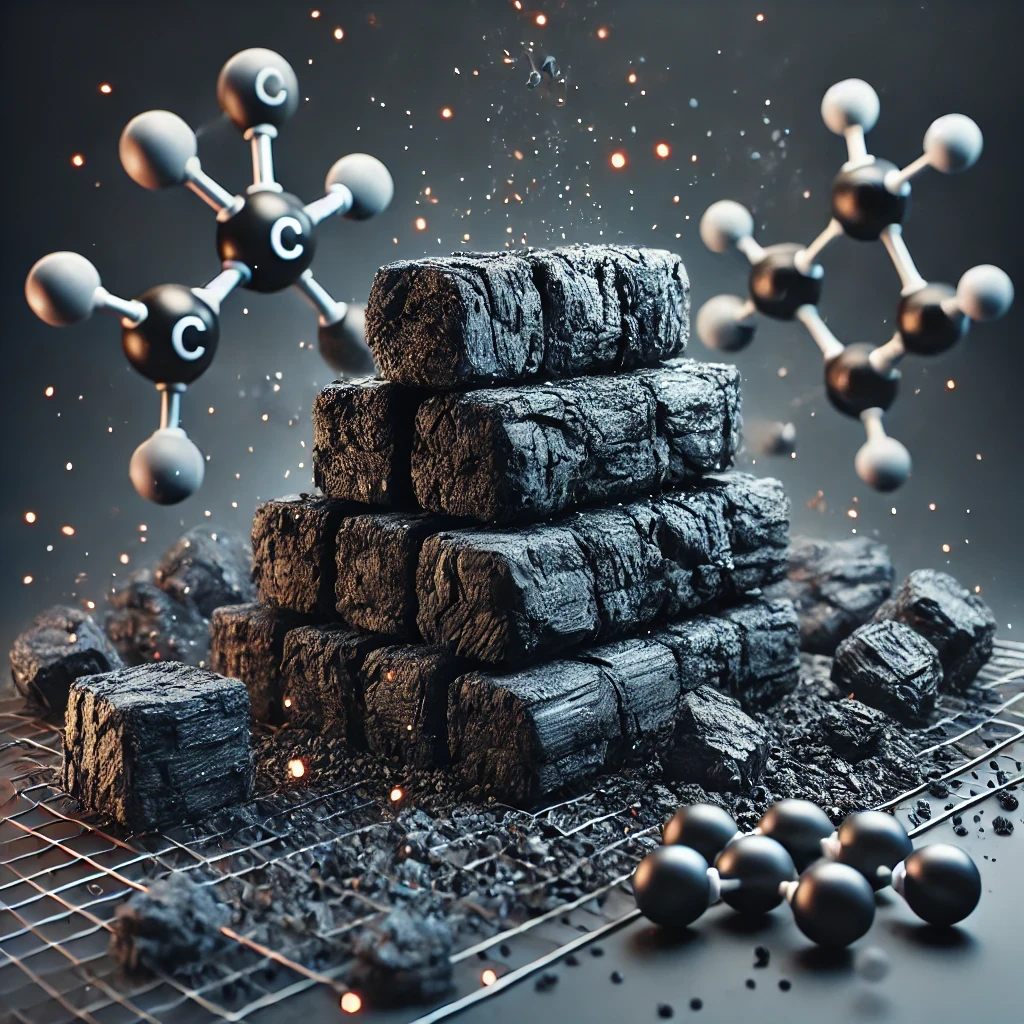Carbon
Definition
Carbon is a chemical element with the symbol C and atomic number 6. It is a non-metal and is the fourth most abundant element in the universe by mass. Carbon exists in various forms, including diamond, graphite, and amorphous carbon, and is essential to all known life, forming the basis of organic chemistry.
Parts of Speech
- Noun
Pronunciation
American English
- IPA Pronunciation: /ˈkɑːrbən/
- Respelling: KAR-buhn
British English
- IPA Pronunciation: /ˈkɑːbən/
- Respelling: KAR-buhn
Etymology
The word "carbon" comes from the Latin word "carbo," meaning "coal" or "charcoal," which was used to describe substances containing carbon. The term entered the scientific lexicon in the late 18th century, when carbon was recognized as a distinct element and key component of many compounds.
Derivatives
- Carbonate (noun)
- Carbonic (adjective)
- Carbonization (noun)
- Decarbonize (verb)
- Carboniferous (adjective)
Synonyms
- Graphite
- Coal
- Diamond
Antonyms
- None
Usage
Carbon is widely used in various fields, including chemistry, biology, and industry. It is the foundational element for organic chemistry and is found in all living organisms. It also plays a critical role in energy production, as it is a key component of fossil fuels like coal and petroleum. In modern discussions of climate change, "carbon emissions" refers to the release of carbon dioxide (CO₂) into the atmosphere, contributing to global warming.
Related Terms
- Carbon dioxide (CO₂): A colorless, odorless gas produced by burning carbon-based fuels and by respiration.
- Carbon footprint: The amount of carbon dioxide emissions for which an individual or organization is responsible.
- Carbon cycle: The natural circulation of carbon between the atmosphere, oceans, and living organisms.
Detailed Definitions
Noun
- A chemical element with atomic number 6: Carbon is a versatile element that forms the basis of all known organic compounds.
- Example: "Carbon forms strong covalent bonds, making it the backbone of organic molecules."
- A substance such as coal or charcoal, rich in carbon content: Refers to materials primarily composed of carbon.
- Example: "Charcoal is a form of carbon used for grilling and industrial purposes."
carbon



🇨🇳 Mandarin (Simplified Chinese)
- 碳 (tàn)
- IPA: /tʰanˋ/
- Respelling: TAHN
🇮🇳 Hindi
- कार्बन (kārban)
- IPA: /kaːrbən/
- Respelling: KAR-bun
🇪🇸 Spanish
- Carbono
- IPA: /karˈbono/
- Respelling: kar-BOH-no
🇫🇷 French
- Carbone
- IPA: /kaʁbɔn/
- Respelling: kar-BON
🇸🇦 Modern Standard Arabic
- كربون (karbūn)
- IPA: /karbuːn/
- Respelling: kar-BOON
🇧🇩 Bengali
- কার্বন (kārbana)
- IPA: /karbɔn/
- Respelling: KAR-bon
🇷🇺 Russian
- Углерод (Uglerod)
- IPA: /ʊglʲɪˈrot/
- Respelling: oog-lee-ROD
🇵🇹 Portuguese
- Carbono
- IPA: /kaʁˈbõnu/
- Respelling: kar-BOH-noo
🇮🇩 Indonesian
- Karbon
- IPA: /karbɔn/
- Respelling: KAR-bon
🇩🇪 German
- Kohlenstoff
- IPA: /ˈkoːlənʃtɔf/
- Respelling: KOH-len-shtof
🇯🇵 Japanese
- 炭素 (Tanso)
- IPA: /tan.so/
- Respelling: TAN-so
🇻🇳 Vietnamese
- Cacbon
- IPA: /kakbon/
- Respelling: KAK-bon
🇰🇷 Korean
- 탄소 (tanso)
- IPA: /tan.so/
- Respelling: TAN-so
🇹🇷 Turkish
- Karbon
- IPA: /kaɾbon/
- Respelling: KAR-bon
🇵🇰 Urdu
- کاربن (kārban)
- IPA: /kaːrbən/
- Respelling: KAR-bun





